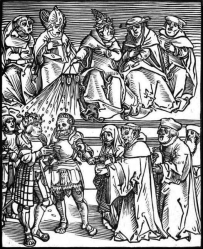
In order to find out, I think it’s important to look at what it can’t be. What it can’t be, unless you have a taste for the perverse twisting of words, is religious tyranny.
Religious freedom is not a license to kill apostates (Qur`an 4:88-91). It is the freedom to become an apostate, convert or adopt any religion or lack thereof.
Religious freedom is not the freedom to discriminate. Even if your sacred texts tell you that white people are better than black people (2 Nephi 5:21), or that homosexuality is an abomination (Leviticus 18:22, Romans 1:26-27, 1 Corinthians 6:9-10), you do not get to discriminate on sex, ethnicity or sexual orientation.
Religious freedom does not mean you get to use public spaces and positions to promote your religion. Public spaces are for everyone and cannot be hijacked for the use of one creed at the exclusion of others. They must be inclusive, and for that they need to be neutral. Elected officials do not represent their church, they represent their constituents, all of them, including those who did not vote for them. Public office is not a tribune, it is a position of responsibility.
Religious freedom does not allow you to avoid your professional and legal responsibilities, even if your moral convictions tell you otherwise. If you are a healthcare professional, you are required to provide the treatments and procedures necessary to improve your patient’s health. In particular you cannot refuse to perform a life-saving procedure. If you feel your religious convictions are more important, maybe you should choose a different line of work, because you are a danger to your patients.
Religious freedom does not mean your ideas are free from criticism. Nobody would dream to penalize political criticism in our secular democracies. We are free to criticize conservatives and liberals freely. Why is it then that religious ideas get a free pass and those who criticize them are accused of intolerance? No, it is healthy that all ideas are open for debate, and criticism is not the same thing as intolerance.
Religious freedom, to generalize, is not the license to apply what’s dictated by sacred texts, over the secular rules of the state (Deuteronomy 4:2). If we are going to live together, there must be one law for all. Anything else creates categories of people, with different rights. It’s also untenable, as many religions exist, with as many contradictory demands. As they can’t be reconciled (they each claim to be absolute and unchangeable), you would need to choose one over the others, which is nothing short of theocracy. Our laws can only reach universality by relying on deeper principles than religious texts. Those principles come from reason, not arbitrary revelation (even if they occasionally align).
Religious freedom is a secular value. It means that you are free to believe as you like, with no intrusion from the state. Nothing more, nothing less.